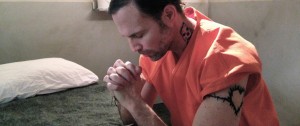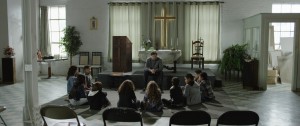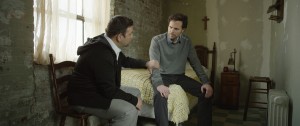By: Jody Taylor January 25, 2016
Gang violence is a prevalent part of our society, therefore it has become a regular subject matter in films today. Many filmmakers go with the angle of glorifying gang members in their perceived ideal lifestyle of wealth, power, and popularity. Others take on the angle of the gang member that is just misunderstood.
The Pastor however takes a different approach, intertwining religion and how a man of God survives in a world where hope and faith do not exist.
As I sat to watch The Pastor, I knew right away that this story would be different. It had a gritty yet organic vibe out of the gate and was shot in way that literally and metaphorically you were reminded of the battle between light and darkness. The film centers on a Pastor, (played by Arturo Muyshondt) who begins the film a prisoner that survives a near fatal knife attack in prison and is sent to solitary confinement for his protection. Ironically, where he is the most confined ends up where he is set free; or so he thinks.
Muyshondt’s ability to wear the emotional struggles and burden on his face as he tries to navigate through to the dangerous life he left behind are subtle yet powerful. He masterfully shows a man desperately trying to progress forward and spread the word of God while masking his fears and doubts that surround his environment and if he will be able to change it.
The Pastor was created by Muyshondt, and the screenplay was written and directed by Deborah Goodwin. After the screening I sat with Arturo to get more on the film and how he created The Pastor.

Q: In the film, the Pastor was almost killed in prison and sent to solitary where he was able to focus on change. Do you feel in the real world, we could create change for our youth if there was a separation from their current environment? If so, do you feel that is the element that is missing from the rehabilitation side of prison for these youth offenders?
A hundred percent.
Q: You mentioned that you did extensive research on gangs and youth offenders, what were the common reasons you found that kids are drawn to gangs and the common reasons they are afraid to leave.
The common reason they seek to join a gang were community, identity, protection, a sense of security, and that’s really what I speak about as a film maker and as an actor. The character (in The Pastor) shows these kids that those same things can be found outside of the gangs. The problem is, as you well pointed out, is how you get out of this world. I’ll tell you something I found out through my research. The only way you can leave these gangs alive is if you find God and become a man of God. The reason my character is able to walk away from this world is he became a Pastor. Using faith as a transformation to a better path. The other rule is you cannot kill anyone’s mother. 
Q: It’s interesting with that said, it seems the same reasons many are drawn into being in a gang, are the same basic principles others are drawn into the world of faith and religion.
That is exactly right.
Q: With so much attention on international terrorism today, while more people are dying in gang related violence in equal if not far great numbers, why do you feel there is more emphasis and attention being placed on one type of violence over the other?
I’ll tell you something, I was just in the United Nations last week, I was a speaker at their conference on poverty, equality, and social violence. I was very honored to be there with Nobel leaders in every field. As I sat there for two days listening to everyone’s presentations I realized this is not only a U.S, problem or a Latin America problem, its problem all across the world. It’s a formula actually. Poverty + inequality = social violence. We have to get to the root of the problem to create a solution. That’s my new life mission. Is to be an agent and a voice for social change. I’ll be using my films, with The Pastor as the first one, to go out there and educate people. Entertain yes, but also to educate and inspire. I’m working now with The Dream Center, a fantastic organization in LA that deals with the misfits in our society. The third leg is to get the corporate leaders and government officials together to try to offer these young kids better options, better choices, better opportunities as they come out of this rehab program.
 Q: I read you came from the world of international investment banking, which is a pretty big switch, are there any similarities in the two careers?
Q: I read you came from the world of international investment banking, which is a pretty big switch, are there any similarities in the two careers?
[Laughs] It is a pretty big switch. When I left investment banking back in 2006, I thought that I was leaving it behind for good. Little did I know as I was embarking in this more artistic and creative endeavor I was going to rely on the very foundation I learned being a banker to get my projects together. I made a very conscious commitment to myself as an actor. I started in the theatre, which was a non traditional method today. Sometimes when you come to LA and tell others you come from theatre, it is not taken as well as when you’re in New York.
Q: There is a great deal of discussion on the lack of social and ethnic diversity at the Oscars again this season. What are your thoughts?
You know, I pay close attention to that obviously as a minority in the U.S. being a Latino I’ve dealt with the same problem we all do, with African Americans and the lack of opportunities and that’s sometimes frustrating. In the case of the Oscars I think that a lot of that depends on the role and depends on the movie. You know everything just has to come together. I do feel privileged that we do have a Latino nominated in the directing category, Alejandro González Iñárritu with The Revenant, that is a good thing. But I think it’s not a problem for The Academy to address, it’s a problem for the industry as a whole because the opportunities and the roles are just not there.
Q: As the writer and lead actor, what do you hope the audience takes away from The Pastor?
I think this journey, because its rooted in reality, I hope it will touch people’s hearts and minds in a way that becomes a universal journey. You don’t have to be a gang member or someone that is thinking about joining a gang to take something out if it. The film speaks about good and evil, light and dark and it really shows how we can change in one second. It’s about faith and community and the love of one another. Going back to the U.N. I was there with people from all over the world and we were speaking about the same things and seeking inspirational tales. It’s great that we have all of the Superman’s, Spiderman’s, and Batman’s. But we need new role models. New types of heroes that ring true to real life and that’s what I think we have with The Pastor.
Q: What will be your next socially relevant subject to tackle in a film?
Its gonna be immigration, human trafficking, and sexual slavery. I can tell you that my movies will be put together with a certain type of confinement. We will never use violence, sex, or drugs just for the sake of using them. That’s sort of been my mission. When you tackle a film about kids and gangs that’s what you expect. But when you see The Pastor its very different. Yes its very intense, but its intense for the right reason. The stakes are high for this character. It a slow burning , high tension, never ending type of movie. But we use cinematography. We use the lighting, we use the music, using the camera angles, using the acting and the same will be true for Sanctuary.
The Pastor opens today.
Article written by Jody Taylor: Twitter: @RealJodyTaylor
